句子的种类与类型
- 格式:doc
- 大小:68.50 KB
- 文档页数:8
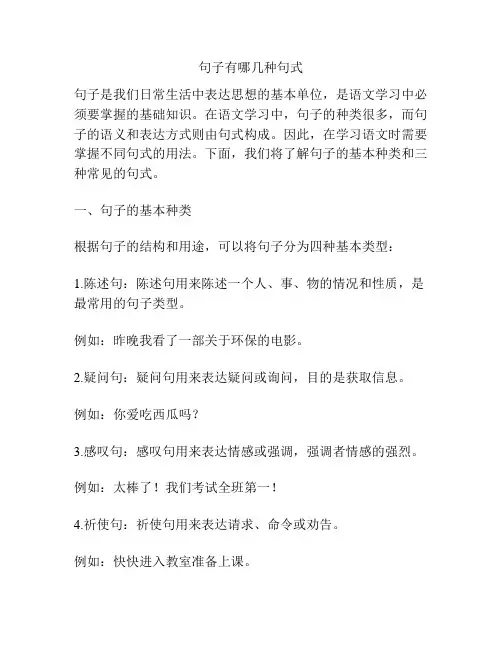
句子有哪几种句式句子是我们日常生活中表达思想的基本单位,是语文学习中必须要掌握的基础知识。
在语文学习中,句子的种类很多,而句子的语义和表达方式则由句式构成。
因此,在学习语文时需要掌握不同句式的用法。
下面,我们将了解句子的基本种类和三种常见的句式。
一、句子的基本种类根据句子的结构和用途,可以将句子分为四种基本类型:1.陈述句:陈述句用来陈述一个人、事、物的情况和性质,是最常用的句子类型。
例如:昨晚我看了一部关于环保的电影。
2.疑问句:疑问句用来表达疑问或询问,目的是获取信息。
例如:你爱吃西瓜吗?3.感叹句:感叹句用来表达情感或强调,强调者情感的强烈。
例如:太棒了!我们考试全班第一!4.祈使句:祈使句用来表达请求、命令或劝告。
例如:快快进入教室准备上课。
二、三种常见的句式1.主谓句主谓句是最简单的一种句式,也是最基本的句式。
它的构成由主语和谓语构成,主语用来表达句子所要描述的人、事、物,谓语则用来表达人、事、物的性质和情况。
例如:小狗跑得很快。
在这个例子中,“小狗”是主语,“跑”是谓语,构成了一个简单的主谓句。
2.主谓宾句主谓宾句是一个由主语、谓语和宾语构成的句子。
主语表示句子所要描述的人、事、物,谓语表示人、事、物的情况和性质,而宾语则表示动作的承受者。
例如:我今天吃了一个苹果。
在这个例子中,“我”是主语,“吃”是谓语,“苹果”是宾语,构成了一个主谓宾句。
3.并列句并列句是由两个或多个并列的句子组成的复杂句子。
它们之间用逗号或者连词连接。
在并列句中,每个句子都可以独立存在。
例如:我喜欢吃苹果,但是我也喜欢吃香蕉。
在这个例子中,“我喜欢吃苹果”和“我也喜欢吃香蕉”是两个并列的句子,用“但是”连接,构成了一个并列句。
总之,在学习语文的过程中,了解句子的种类和句式是必不可少的。
只有掌握好句子的基本结构和用法,才能够更好地表达自己的思想和观点。
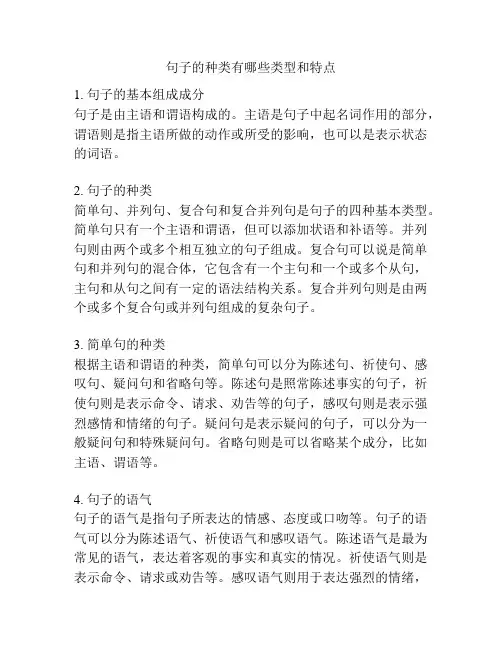
句子的种类有哪些类型和特点1. 句子的基本组成成分句子是由主语和谓语构成的。
主语是句子中起名词作用的部分,谓语则是指主语所做的动作或所受的影响,也可以是表示状态的词语。
2. 句子的种类简单句、并列句、复合句和复合并列句是句子的四种基本类型。
简单句只有一个主语和谓语,但可以添加状语和补语等。
并列句则由两个或多个相互独立的句子组成。
复合句可以说是简单句和并列句的混合体,它包含有一个主句和一个或多个从句,主句和从句之间有一定的语法结构关系。
复合并列句则是由两个或多个复合句或并列句组成的复杂句子。
3. 简单句的种类根据主语和谓语的种类,简单句可以分为陈述句、祈使句、感叹句、疑问句和省略句等。
陈述句是照常陈述事实的句子,祈使句则是表示命令、请求、劝告等的句子,感叹句则是表示强烈感情和情绪的句子。
疑问句是表示疑问的句子,可以分为一般疑问句和特殊疑问句。
省略句则是可以省略某个成分,比如主语、谓语等。
4. 句子的语气句子的语气是指句子所表达的情感、态度或口吻等。
句子的语气可以分为陈述语气、祈使语气和感叹语气。
陈述语气是最为常见的语气,表达着客观的事实和真实的情况。
祈使语气则是表示命令、请求或劝告等。
感叹语气则用于表达强烈的情绪,比如惊讶、愤怒或高兴等。
5. 句子长度和复杂度句子的长度和复杂度是指句子的字数、补充成分和语言复杂度的综合评价。
句子的长度可能长或短,长的句子一般包含许多信息和细节,而短句则更为简单。
句子的复杂度取决于主句和从句的复杂度,从句可以分为定语从句、状语从句和主语从句等。
一些特殊的从句关系也会影响句子的复杂度,比如比较从句、条件从句和因果关系从句等。
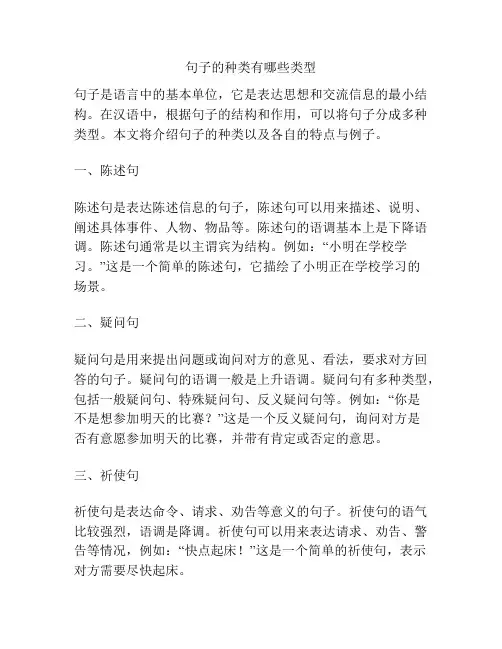
句子的种类有哪些类型句子是语言中的基本单位,它是表达思想和交流信息的最小结构。
在汉语中,根据句子的结构和作用,可以将句子分成多种类型。
本文将介绍句子的种类以及各自的特点与例子。
一、陈述句陈述句是表达陈述信息的句子,陈述句可以用来描述、说明、阐述具体事件、人物、物品等。
陈述句的语调基本上是下降语调。
陈述句通常是以主谓宾为结构。
例如:“小明在学校学习。
”这是一个简单的陈述句,它描绘了小明正在学校学习的场景。
二、疑问句疑问句是用来提出问题或询问对方的意见、看法,要求对方回答的句子。
疑问句的语调一般是上升语调。
疑问句有多种类型,包括一般疑问句、特殊疑问句、反义疑问句等。
例如:“你是不是想参加明天的比赛?”这是一个反义疑问句,询问对方是否有意愿参加明天的比赛,并带有肯定或否定的意思。
三、祈使句祈使句是表达命令、请求、劝告等意义的句子。
祈使句的语气比较强烈,语调是降调。
祈使句可以用来表达请求、劝告、警告等情况,例如:“快点起床!”这是一个简单的祈使句,表示对方需要尽快起床。
四、感叹句感叹句是表达感叹、惊讶、喜悦、失望等情感的句子。
感叹句的语气比较强烈,常常使用感叹词来强调情感。
例如:“多么美好的天气啊!”这是一个简单的感叹句,表示对天气美好感到惊讶和喜悦。
五、并列句并列句是由两个或多个具有相同等级关系的句子组成的复合句。
并列句的句子之间用连词连接,有时可以省略连词。
例如:“我喜欢跑步,他喜欢游泳。
”这是一个简单的并列句,表示两个句子之间的关系是平等的。
六、复合句复合句是具有主句和从句的句子。
从句分为名词性从句、形容词性从句和副词性从句。
复合句可以用来表达复杂的语义信息,常常用于描述事件的因果关系、条件、转折、让步等。
例如:“我去看电影,因为我喜欢看电影。
”这是一个简单的复合句,表示主句和从句之间有因果关系。
总之,句子是表达思想和交流信息的基本单位,具有多种类型。
不同的句子类型有着不同的特点和用法,可根据具体情境来选择使用。
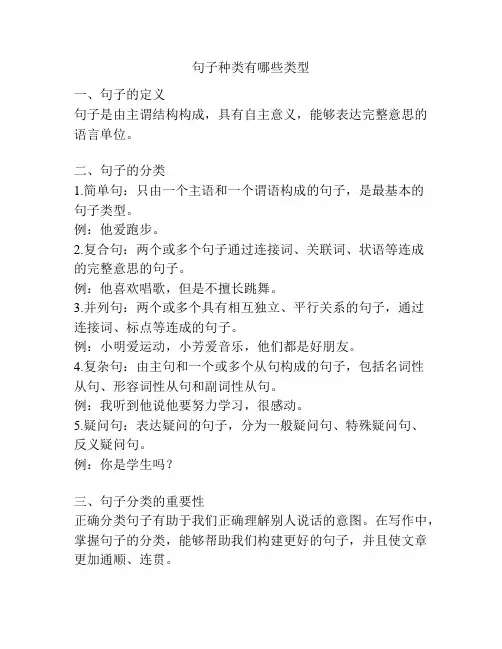
句子种类有哪些类型
一、句子的定义
句子是由主谓结构构成,具有自主意义,能够表达完整意思的语言单位。
二、句子的分类
1.简单句:只由一个主语和一个谓语构成的句子,是最基本的
句子类型。
例:他爱跑步。
2.复合句:两个或多个句子通过连接词、关联词、状语等连成
的完整意思的句子。
例:他喜欢唱歌,但是不擅长跳舞。
3.并列句:两个或多个具有相互独立、平行关系的句子,通过
连接词、标点等连成的句子。
例:小明爱运动,小芳爱音乐,他们都是好朋友。
4.复杂句:由主句和一个或多个从句构成的句子,包括名词性
从句、形容词性从句和副词性从句。
例:我听到他说他要努力学习,很感动。
5.疑问句:表达疑问的句子,分为一般疑问句、特殊疑问句、
反义疑问句。
例:你是学生吗?
三、句子分类的重要性
正确分类句子有助于我们正确理解别人说话的意图。
在写作中,掌握句子的分类,能够帮助我们构建更好的句子,并且使文章更加通顺、连贯。
四、句子分类的注意事项
1.语气:不同的句子分类会表达不同的语气,如陈述、疑问、命令等。
2.主谓结构:句子构成的基础是主谓结构,所以正确理解主谓结构对于正确分类句子是非常重要的。
3.从句位置:复杂句的分类需要注意从句的位置,以正确理解从句的功能。
五、结语
句子分类有利于我们更好的理解和表达语言,正确分类和使用句子类型能够提高文章质量,进一步提升个人言语表达和写作能力。
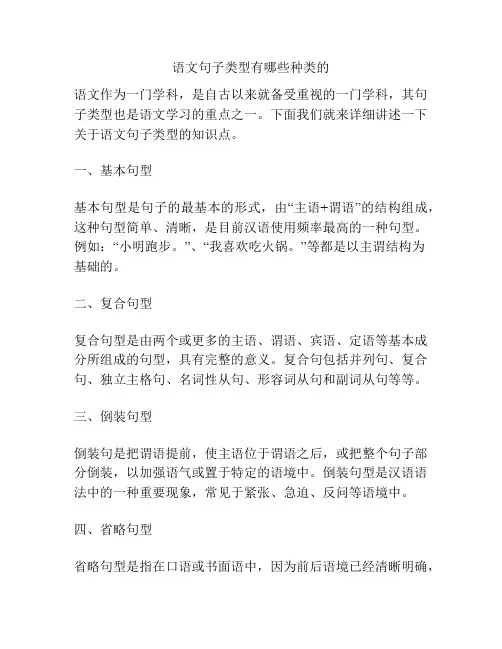
语文句子类型有哪些种类的语文作为一门学科,是自古以来就备受重视的一门学科,其句子类型也是语文学习的重点之一。
下面我们就来详细讲述一下关于语文句子类型的知识点。
一、基本句型基本句型是句子的最基本的形式,由“主语+谓语”的结构组成,这种句型简单、清晰,是目前汉语使用频率最高的一种句型。
例如:“小明跑步。
”、“我喜欢吃火锅。
”等都是以主谓结构为基础的。
二、复合句型复合句型是由两个或更多的主语、谓语、宾语、定语等基本成分所组成的句型,具有完整的意义。
复合句包括并列句、复合句、独立主格句、名词性从句、形容词从句和副词从句等等。
三、倒装句型倒装句是把谓语提前,使主语位于谓语之后,或把整个句子部分倒装,以加强语气或置于特定的语境中。
倒装句型是汉语语法中的一种重要现象,常见于紧张、急迫、反问等语境中。
四、省略句型省略句型是指在口语或书面语中,因为前后语境已经清晰明确,因此省略部分成分,使句子简洁、流畅。
省略的内容可以是主语、谓语、宾语、状语等。
这种语言形式不仅时常出现于口语表达之中,也是日常书面语的常见表达方式之一。
五、借代句型借代是指一种语言现象,在语言符号中,用一个符号代表另一个符号,即借用某一个概念代表另一概念。
借代句型是指在一个句子中,某个成分的名称被省略而只留下所代表的对象,使得整个句子更加简洁、精炼。
例如:“王五钱包被偷了,他去派出所报案了。
”中,只有“他”是王五的代称。
总之,语文句子类型种类繁多,不同类型的句子具有不同的特点和用途。
了解各种类型的句子,可以帮助我们更好地理解和运用句子,在阅读、写作等方面更加游刃有余。
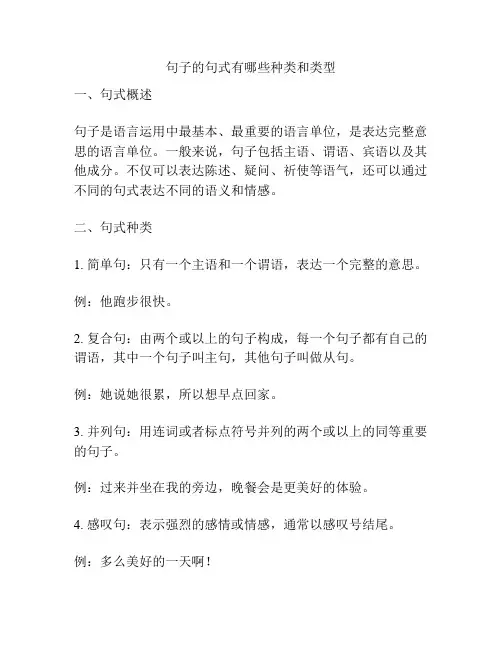
句子的句式有哪些种类和类型一、句式概述句子是语言运用中最基本、最重要的语言单位,是表达完整意思的语言单位。
一般来说,句子包括主语、谓语、宾语以及其他成分。
不仅可以表达陈述、疑问、祈使等语气,还可以通过不同的句式表达不同的语义和情感。
二、句式种类1. 简单句:只有一个主语和一个谓语,表达一个完整的意思。
例:他跑步很快。
2. 复合句:由两个或以上的句子构成,每一个句子都有自己的谓语,其中一个句子叫主句,其他句子叫做从句。
例:她说她很累,所以想早点回家。
3. 并列句:用连词或者标点符号并列的两个或以上的同等重要的句子。
例:过来并坐在我的旁边,晚餐会是更美好的体验。
4. 感叹句:表示强烈的感情或情感,通常以感叹号结尾。
例:多么美好的一天啊!5. 祈使句:表示请求、命令、劝告等,通常以动词原形开头。
例:把书拿给我。
三、句式类型1. 简单句类型断言句、疑问句、祈使句2. 复合句类型主从句类型、并列句类型、间接引语类型3. 平衡句类型对偶句、三段论句、反问句4. 比较句类型比喻句、拟人句、对比句5. 描述句类型描绘句、夸张句、概括句四、句式分析句子分析是语言学分析的一个分支,在文学、语言学市场中都有重要的作用。
可以从以下几个方面对句式进行分析:1. 句子成分分析句子成分包括主语、宾语、谓语、定语、状语、补语等。
分析句子成分可以帮助我们更好地理解句子的意义。
2. 句子结构分析句子结构分析指的是句子在语法上的结构形式,包括并列句、复合句、长句等。
分析句子结构有助于我们了解句子在语言中的功能和作用。
3. 句子语调分析句子语调分析指的是句子在语音上的声调和节奏。
分析句子语调可以帮助我们更好地理解句子的语感和情感。
4. 句子语言层次分析句子语言层次分析指的是句子在语言上的形式美感和文化内涵。
分析句子语言层次可以帮助我们更好地欣赏和理解作品中的语言表达。
五、小结句式是语言表达中重要的组成部分,包括简单句、复合句、并列句、感叹句、祈使句等不同的种类和类型。
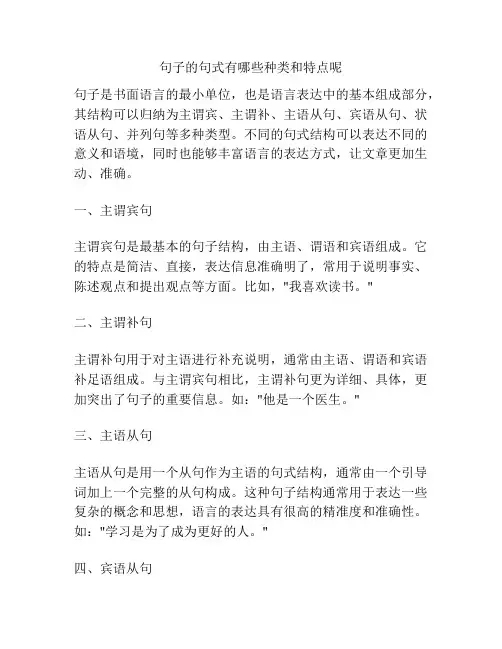
句子的句式有哪些种类和特点呢句子是书面语言的最小单位,也是语言表达中的基本组成部分,其结构可以归纳为主谓宾、主谓补、主语从句、宾语从句、状语从句、并列句等多种类型。
不同的句式结构可以表达不同的意义和语境,同时也能够丰富语言的表达方式,让文章更加生动、准确。
一、主谓宾句主谓宾句是最基本的句子结构,由主语、谓语和宾语组成。
它的特点是简洁、直接,表达信息准确明了,常用于说明事实、陈述观点和提出观点等方面。
比如,"我喜欢读书。
"二、主谓补句主谓补句用于对主语进行补充说明,通常由主语、谓语和宾语补足语组成。
与主谓宾句相比,主谓补句更为详细、具体,更加突出了句子的重要信息。
如:"他是一个医生。
"三、主语从句主语从句是用一个从句作为主语的句式结构,通常由一个引导词加上一个完整的从句构成。
这种句子结构通常用于表达一些复杂的概念和思想,语言的表达具有很高的精准度和准确性。
如:"学习是为了成为更好的人。
"四、宾语从句宾语从句是用一个从句作为宾语的句式结构,常常被用来进一步展开主语所描述的事件或情境,为读者提供更加详细的信息和背景条件。
而宾语从句的引导词也多种多样,如"它"、"谁"、"哪"等。
如:"她想知道他是否爱她。
"五、状语从句状语从句是用从句作为状语的句式结构,用于修饰主句谓语动词、形容词、副词等,进一步说明动作、时间、地点、方式等。
同时,状语从句也具有很强的语言表达能力和表现力。
如:"每天早上,当我看到阳光照在花园里的时候,我感到很幸福。
"六、并列句并列句是由两个或多个等同或平行的结构所组成的句子,常常被用于表达对比、转折、列举、并列关系等。
并列句的句式灵活多变,具有很强的语言表达能力,同时也更加生动、有趣。
如:"春天到了,花开满园;秋季来临,果实累累。
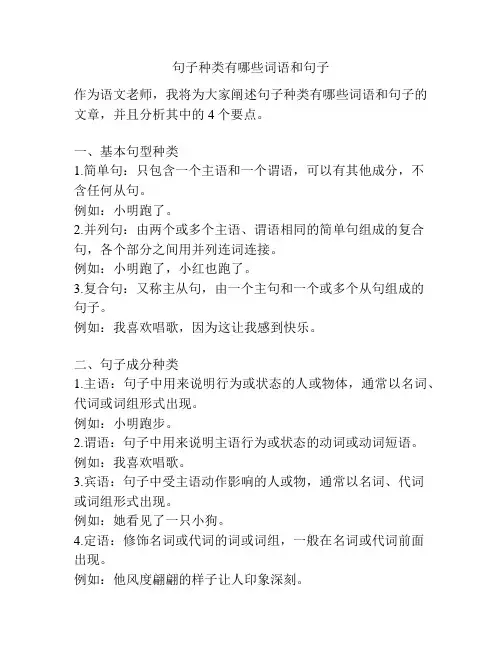
句子种类有哪些词语和句子作为语文老师,我将为大家阐述句子种类有哪些词语和句子的文章,并且分析其中的4个要点。
一、基本句型种类1.简单句:只包含一个主语和一个谓语,可以有其他成分,不含任何从句。
例如:小明跑了。
2.并列句:由两个或多个主语、谓语相同的简单句组成的复合句,各个部分之间用并列连词连接。
例如:小明跑了,小红也跑了。
3.复合句:又称主从句,由一个主句和一个或多个从句组成的句子。
例如:我喜欢唱歌,因为这让我感到快乐。
二、句子成分种类1.主语:句子中用来说明行为或状态的人或物体,通常以名词、代词或词组形式出现。
例如:小明跑步。
2.谓语:句子中用来说明主语行为或状态的动词或动词短语。
例如:我喜欢唱歌。
3.宾语:句子中受主语动作影响的人或物,通常以名词、代词或词组形式出现。
例如:她看见了一只小狗。
4.定语:修饰名词或代词的词或词组,一般在名词或代词前面出现。
例如:他风度翩翩的样子让人印象深刻。
5.状语:修饰动词、形容词、副词等的词或词组,表达时间、地点、方式、原因等词性。
例如:他毅然做出了决定。
三、句子的修辞手法1.比喻:用一个形象生动的事物来表示另一个事物,加深比较对象的理解。
例如:他的心如同一朵蓝色玫瑰,孤独而美丽。
2.拟人:将无生命的事物描写成有生命的形式,给人以鲜明的形象感受。
例如:风儿轻轻地从我的面颊上拂过,温柔地问候着我。
3.排比:利用互相平行的语句形式,使语言更加简洁明了、鲜明生动。
例如:学生们,让我们用心听、用眼看、用脑思,共创美好的明天。
4.反问:用疑问的方式表达肯定或否定的意思。
例如:这样的机会你舍得放过吗?四、文章的句式运用1.写景:通过对自然环境的描写来表现人物情感,采用定语和状语的修辞手法,使文章更加生动形象。
例如:夕阳下的山头,一只可爱的小松鼠在玩耍。
2.写人:通过对人物的情感、性格、语言、行为等的描述来塑造人物形象,运用比喻、拟人等修辞手法,使文章更具生动感。
例如:他的战斗精神如同勇士般顽强无畏,不屈不挠地奋斗着。
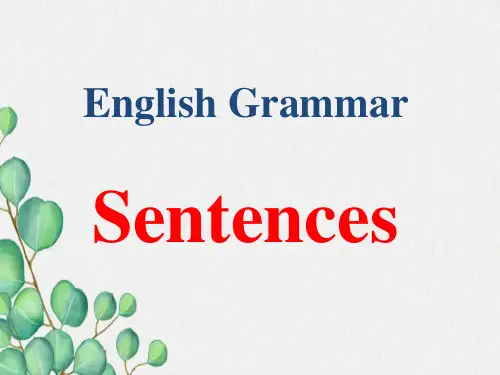
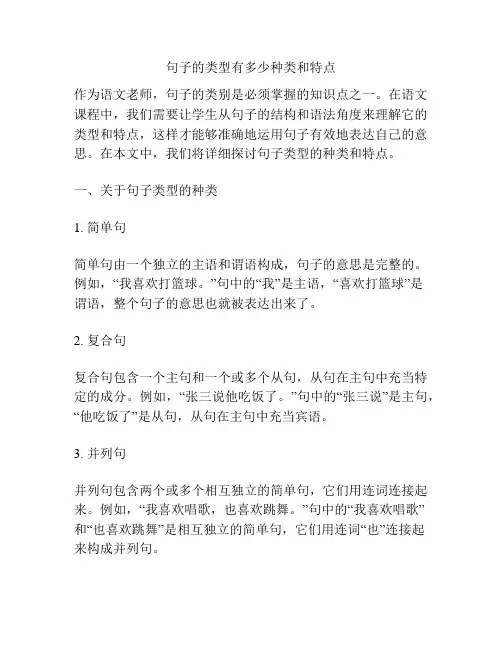
句子的类型有多少种类和特点作为语文老师,句子的类别是必须掌握的知识点之一。
在语文课程中,我们需要让学生从句子的结构和语法角度来理解它的类型和特点,这样才能够准确地运用句子有效地表达自己的意思。
在本文中,我们将详细探讨句子类型的种类和特点。
一、关于句子类型的种类1. 简单句简单句由一个独立的主语和谓语构成,句子的意思是完整的。
例如,“我喜欢打篮球。
”句中的“我”是主语,“喜欢打篮球”是谓语,整个句子的意思也就被表达出来了。
2. 复合句复合句包含一个主句和一个或多个从句,从句在主句中充当特定的成分。
例如,“张三说他吃饭了。
”句中的“张三说”是主句,“他吃饭了”是从句,从句在主句中充当宾语。
3. 并列句并列句包含两个或多个相互独立的简单句,它们用连词连接起来。
例如,“我喜欢唱歌,也喜欢跳舞。
”句中的“我喜欢唱歌”和“也喜欢跳舞”是相互独立的简单句,它们用连词“也”连接起来构成并列句。
二、关于句子类型的特点1. 简单句的特点简单句的特点是由一个主语和谓语构成,并且句子的意思是完整的。
它可以用来独立表达一个完整的句子,也可以作为复合句或并列句的一个组成部分。
此外,简单句还可以根据它里面的谓语动词的形式来划分,可以是肯定句、否定句、疑问句等。
2. 复合句的特点复合句的特点是包含一个主句和一个或多个从句。
从句在主句中起到特定的作用,可以作为主语、宾语、表语、定语、状语等。
从句的引导词有很多种,例如关系代词“谁、哪、何”等,关系副词“为什么、如何、何时”等,以及连词“因为、如果、虽然”等,具体应根据从句的语法结构和语义关系来判断。
3. 并列句的特点并列句的特点是由两个或多个简单句用连词连接而成,它们之间没有主谓关系,但是它们是有并列关系的。
句子的逻辑关系可以是并列关系、转折关系、选择关系等。
例如,“他喜欢唱歌,但不会跳舞。
”句中的“他喜欢唱歌”和“不会跳舞”之间是转折关系,它们用连词“但”连接起来构成了一个并列句。
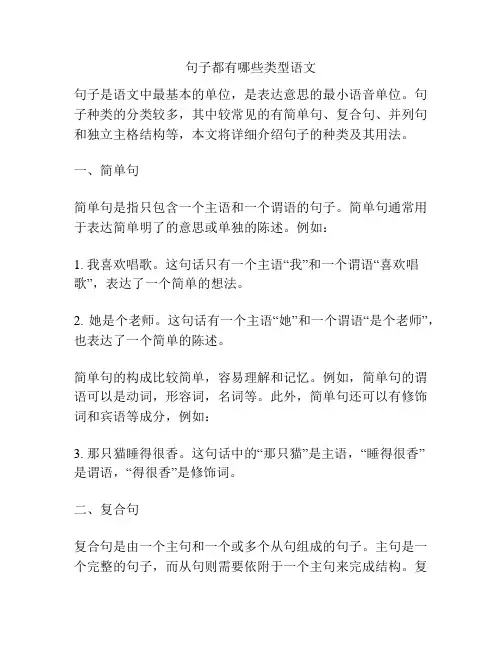
句子都有哪些类型语文句子是语文中最基本的单位,是表达意思的最小语音单位。
句子种类的分类较多,其中较常见的有简单句、复合句、并列句和独立主格结构等,本文将详细介绍句子的种类及其用法。
一、简单句简单句是指只包含一个主语和一个谓语的句子。
简单句通常用于表达简单明了的意思或单独的陈述。
例如:1. 我喜欢唱歌。
这句话只有一个主语“我”和一个谓语“喜欢唱歌”,表达了一个简单的想法。
2. 她是个老师。
这句话有一个主语“她”和一个谓语“是个老师”,也表达了一个简单的陈述。
简单句的构成比较简单,容易理解和记忆。
例如,简单句的谓语可以是动词,形容词,名词等。
此外,简单句还可以有修饰词和宾语等成分,例如:3. 那只猫睡得很香。
这句话中的“那只猫”是主语,“睡得很香”是谓语,“得很香”是修饰词。
二、复合句复合句是由一个主句和一个或多个从句组成的句子。
主句是一个完整的句子,而从句则需要依附于一个主句来完成结构。
复合句更加复杂,语法结构也比较抽象。
例如:1. 我发现,天已经黑了。
这句话中的“我发现”是主句,“天已经黑了”是一个时间状语从句。
2. 她告诉我,她最近在学中文。
这个句子中的“她告诉我”是主句,“她最近在学中文”是一个宾语从句。
由于复合句涉及到主从句之间的关系,所以需要特别注意两者之间的引导词。
例如,引导时间、条件、目的、原因等关系的从属词如“当……时候”、“如果”、“为了”、“因为”等。
三、并列句并列句是由两个或多个具有相等地位的独立分句组成的句子,用逗号或句号分开。
并列句可以有多个主语和谓语,但它们需要同等重要或同一地位。
例如:1. 她去了加拿大,他去了澳大利亚。
这个句子中有两个并列的分句,用逗号隔开,表达了两个同等重要的情况。
2. 他喜欢打篮球,她喜欢跑步。
这个句子中也有两个并列分句,用逗号分开。
并列句在语法结构上相对简单,但需要注意的是两个分句之间的逻辑关系。
例如,两个分句可以是并列关系,也可以是转折或因果关系等。
句子的种类与类型句子是具有一定的语法结构,表达一个独立完整意义的语言单位。
高考重点要求:1.掌握感叹句的用法和构成2.掌握祈使句的构成及作用3.掌握一般疑问句、选择疑问句、特殊疑问句、反意疑问句的应答4.分清简单句和复合句的类型一、句子的成分句子一般能够分为几个部分,每一个部分在句子中具有一定的功能,称为句子的成分。
句子的成分有主语、谓语、表语、宾语、补语、定语和状语。
1.主语是一个句子的中心,主语的位置一般在句首。
2.谓语动词说明主语的动作与状态,一般在主语之后。
3.表语位置在连系动词之后,说明主语的身份、特征和状态。
4.宾语表示动作的对象,即动作的承受者,一般放在及物动词或介词后。
5.补语补充说明宾语或主语的特征或状态.6.定语修饰名词、代词7.状语修饰动词、形容词、副词以及全句。
二、句子的类型1、按句子的用途可分为陈述句、疑问句、祈使句和感叹句四种:1)陈述句(肯定、否定):用来陈述一件事实或表达一种看法如:He is six years old.She didn’t hear of you before.2)疑问句(一般、特殊、选择、反意):用来提出疑问如:Do they like skating?How old she is?Is he six or seven years old?Mary can swim. can’t she?3)祈使句:用来表示发出命令或发出请求如:Be careful, boys.Don’t talk in class.4)感叹句:用来表示各种强烈的感情如:How clever the boy is!What a delicious hamburger!2、按句子的结构可分为简单句、并列句和复合句三种:1)简单句:只有一个主语(或并列主语)和一个谓语(或并列谓语)。
如.:He often reads English in the morning.Tom and Mike are American boys.She like drawing and often draws pictures for the wall newspaper.2) 并列句:包含两个或两个以上主谓结构的句子,句语句之间通常用并列连词或分号来连接。
句子包括哪些种类及特殊句型句子是我们日常中不可避免的语言形式,是语言最基础的单位。
从句子结构的角度来看,常常有简单句、并列句、复合句、疑问句、祈使句、感叹句等等不同种类。
此外,还有一些特殊句型,如倒装句、省略句、反问句等。
下面我们将详细介绍这些语言形式。
简单句是最基本、最简单的语句形式,由一个主语和一个谓语构成,它可以单独表达一个完整的意思。
例如:我喜欢运动。
在这个句子中,“我”是主语,表示的是“喜欢运动”的人;“喜欢运动”是谓语,表示的是“我”喜欢什么。
并列句是由两个或者多个简单句通过并列连词(如“而且”、“但是”、“或者”)等连接而成的句子,这些成分彼此之间是平等的、互不制约的。
例如:我很喜欢北京,而且我也很喜欢上海。
这个句子是由两个简单句组成,中间用“而且”连接起来。
构成成分中的结构相同或近似,句意上意义独立。
复合句是由一个主句和一个或者多个从句构成的句子。
主句和从句之间有一定的逻辑关系,从句在语法和意义上都是主句的一部分。
例如:我在等你,因为我很想见到你。
这个句子中,“我在等你”是主句,也是完整的句子,而“因为我很想见到你”是一个原因状语从句,给出了“我在等你”的原因,这个从句是主句的一个补充说明。
疑问句是询问对方的意见、情况、判断等的句子。
疑问句一般用疑问代词(如何、什么、为什么等)或者疑问词语(谁、什么时候、哪里等)开头。
例如:你今天想去哪儿吃饭?这个句子是一个由疑问代词“哪儿”开头的疑问句,询问对方今天想去哪个地方吃饭。
祈使句是表示请求、命令等语气的句子,不必含有主语,谓语用通用的动词原形,整个句子的语气比较强烈。
例如:走路小心,别摔倒。
这个句子中,“走路小心”是祈使句,是一种请求或者命令的形式。
感叹句是表示强烈的感情或者情感的句子,在句末用感叹号(!)表示语气的强烈。
例如:多么美好的一天啊!这个句子中,“多么美好的一天啊”是一句感叹句,表达的是说话者对当天的美好天气和心情的强烈感受。
语文句子类型有哪些方面的一、语文句子类型的定义语文句子是由一个或多个单词构成的,能够表达完整意思的语言单位。
语文句子类型指的是根据结构、功能、形式等方面的不同而划分的句子种类。
二、语文句子类型的分类根据所表达的语义内容不同,语文句子可以分为陈述句、疑问句、祈使句、感叹句四大类。
1. 陈述句:陈述句是表达说话者所持有的主观观点、感受、想法、描述事实、状态等的句子,其语气较为平缓、客观。
例如,“天空是蓝色的”、“他很高兴”等。
2. 疑问句:疑问句是表达询问、询盘、疑虑的句子,其语气较为明显、质疑。
例如,“你明天打算去哪里?”、“这道题为什么错了?”等。
3. 祈使句:祈使句是表达命令、请求、劝诫等的句子,其语气较为强烈、肯定。
例如,“快把杯子拿来!”、“不要吵,安静点!”等。
4. 感叹句:感叹句是由感叹词加上其他成分构成的句子,表示感情色彩强烈、赞叹、责骂、惊叹等情绪,其语气较为激动、表达强烈。
例如,“真是美丽的风景!”、“真是太过分了!”等。
三、语文句子类型的特点1. 陈述句:陈述句的语序通常为主语+谓语+宾语+宾补等,语气平和、肯定。
2. 疑问句:疑问句在语序上与陈述句相反,通常为疑问词(如何、为什么、哪儿等)+ 谓语 + 主语 + 其他修饰等,语气疑问、不确定。
3. 祈使句:祈使句中通常省略主语,语序一般是谓语+宾语或者祈使词(快、慢、多等)+ 宾语,语气强烈、肯定。
4. 感叹句:感叹句的语序多种多样,但必须有感叹词,语气强烈、表现强烈情感。
四、语文句子类型的应用陈述句是人们日常交流和表达意见的基本形式,可用于句子的说明,描写、议论等。
疑问句常常用来询问事物的情况、了解他人的想法等,是一种表达不确定性和疑问的方式。
祈使句常常用于口头交流、书面通信中,能让人更加明白主张、态度、意图。
感叹句常常用于表达强烈的情感、感触,是一种强烈表达情感的方式。
五、语文句子类型的注意事项不同的语文句子类型在使用时要注意语气、修饰等的不同。
第一节句子的类型句子可以从不同的角度进行分类。
按照句子的语气,句子可分为陈述句、祈使句、感叹句、疑问句四种,一般称为句类。
按照句子的结构,句子可分为单句和复句或主谓句和非主谓句等,一般称为句型。
句类和句型可统称为句式。
1、陈述句:陈述、祈使、感叹、警示等功能。
(言语意义)2、疑问句:疑问、陈述、强调(设问、反问)3、祈使句:多用于命令人、请求、建议、警告等交际目的。
4、感叹句:突出感情态度,调节话语的风格、增强文气。
二、句形的长短——长句、短句长句是指句子的形体长,词语的数量多,结构比较复杂的句子。
短句是指句子的形体短,词语的数量少,结构比较简单的句子。
不同的句式具有不同的修辞效果。
句子的长短并没有一个明晰具体的分界线,只是相对而言。
形成长句的原因:(一)句子带有修饰语,有的修饰语比较长;(二)句子的某个成分是由并列词组充当的;(三)句子的某个成分是由连动词组充当的;(四)句子的某个成分也是句子形式。
长句化短方法:(一)抽出修饰语;(二)运用叠用句;(三)合叙改分述。
四、肯定句和否定句肯定句——表示肯定语气的句子;否定句——表示否定语气的句子。
肯定句一般比较直率、明确;否定句的语气比较委婉、灵活。
1、语法肯定句语法否定句2、语义肯定句与语义否定句语法否定句是指语法形式是否定的,句子中有否定词且否定谓语或否定词本身就是谓语。
五、句式的松紧之分松句就是结构松散、信息分散的一组句子。
而紧句,则是结构紧凑、信息集中的句子。
句式的松紧是相对于确定的信息与其表现的关系而言的。
松句往往是一组句子,紧句一般是一个或两个句子,两者具有相对关系。
一、什么是比喻概念:比喻,俗称打比方,就是用某一事物来说明与其本质不同而又有相似之处的另一事物。
基本格式:本体——比喻词——喻体——喻解(相似点)二、比喻的类型基本类型:1.明喻:也叫“直喻”2.暗喻:也叫“隐喻”3.借喻:直接借助喻体变式比喻:博喻、引喻、较喻、否喻(反喻)、曲喻、回喻、虚喻等等讽喻●概念:讽喻主要是通过讲故事打比方来说明某种道理。
句子的种类有哪些类型和特点呢作为语文老师,句子是我们所讲授的基本单元。
语言艺术的构成的基础在于句子的准确性和优美性,因此,我们必须好好地了解句子的种类及特点,以便将这些知识传授给学生们。
下面将详细谈论句子的种类和特点。
一、陈述句陈述句是最常见的句子类型,最基本的语句类型之一,所表达的意思是陈述或陈述性的意思。
其特点是陈述或描述一件或几件事情或事物。
句子结构为主语+谓语。
例如,小明在学校学习。
二、问句问句是表示提出问题或询问的句子。
其特点是语气疑问,以问号结尾。
句子结构为疑问词+主语+谓语。
例如,你喜欢什么颜色?三、感叹句感叹句表示强烈的情感和感叹,通常有感叹词作为引导。
其特点是标点符号为感叹号。
句子结构为感叹词+其他成分。
例如,多么美丽的花啊!四、祈使句祈使句是表达命令、请求、建议、劝告等意思的句子类型。
其特点是语气祈求,句子结构为谓语+其他成分,通常省略主语。
例如,走吧!以上是句子的四种基本类型和其特点,下面从四个方面对其进行分析。
1、语气句子类型之间的不同在于语气的不同。
陈述句语气较为平缓,较为自然;问句语气较为疑问,需要别人回答;感叹句语气较为惊讶或者喜悦;祈使句语气更强烈,属于命令或者建议。
2、标点符号标点符号也是句子类型之间的显著区别。
陈述句和感叹句使用句号或感叹号作为句子结束的标点;问句则使用问号;祈使句则没有标点。
3、结构四种类型的句子的语法结构也是不同的。
陈述句和祈使句的语序基本不变,一般为主语+谓语;问句和感叹句则可能会涉及到疑问词或感叹词的加入。
4、用途句子类型的差异还体现在其应用场景上。
陈述句用来描述事件、情况等,表达一种事实,是最常用的句子类型;问句常常被用来表示询问的语气,请求对方回答;感叹句更多地表达情感,让人感受到以及强烈的情感体验;祈使句是比较命令性语气的,常常用于控制对方。
总之,四种类型的句子各有其特点。
作为语文老师,我们应当通过对不同类型句子的教学,让学生加深对句子的认识和理解,提高理解和表达能力。
句子的种类与类型句子是具有一定的语法结构,表达一个独立完整意义的语言单位。
高考重点要求:1.掌握感叹句的用法和构成2.掌握祈使句的构成及作用3.掌握一般疑问句、选择疑问句、特殊疑问句、反意疑问句的应答4.分清简单句和复合句的类型一、句子的成分句子一般可以分为几个部分,每一个部分在句子中具有一定的功能,称为句子的成分。
句子的成分有主语、谓语、表语、宾语、补语、定语和状语。
1.主语是一个句子的中心,主语的位置一般在句首。
2.谓语动词说明主语的动作与状态,一般在主语之后。
3.表语位置在连系动词之后,说明主语的身份、特征和状态。
4.宾语表示动作的对象,即动作的承受者,一般放在及物动词或介词后。
5.补语补充说明宾语或主语的特征或状态.6.定语修饰名词、代词7.状语修饰动词、形容词、副词以及全句。
二、句子的类型1、按句子的用途可分为陈述句、疑问句、祈使句和感叹句四种:1)陈述句(肯定、否定):用来陈述一件事实或表达一种看法如:He is six years old.She didn’t hear of you before.2)疑问句(一般、特殊、选择、反意):用来提出疑问如:Do they like skating?How old she is?Is he six or seven years old?Mary can swim. can’t she?3)祈使句:用来表示发出命令或发出请求如:Be careful, boys.Don’t talk in class.4)感叹句:用来表示各种强烈的感情如:How clever the boy is!What a delicious hamburger!2、按句子的结构可分为简单句、并列句和复合句三种:1)简单句:只有一个主语(或并列主语)和一个谓语(或并列谓语)。
如.:He often reads English in the morning.Tom and Mike are American boys.She like drawing and often draws pictures for the wall newspaper.2) 并列句:包含两个或两个以上主谓结构的句子,句语句之间通常用并列连词或分号来连接。
句子的种类与类型句子是具有一定的语法结构,表达一个独立完整意义的语言单位。
高考重点要求:1.掌握感叹句的用法和构成2.掌握祈使句的构成及作用3.掌握一般疑问句、选择疑问句、特殊疑问句、反意疑问句的应答4.分清简单句和复合句的类型第一节知识点扫描一、句子的类型1.句子按结构分可分为简单句、并列句和复合句P149简单句类型讲解; P150.7练习1)&2)简单句只有一个主语(或并列主语)和一个谓语动词(或并列谓语动词)。
例如:He likes swimming and often swims in the river.并列句由并列连词把两个或两个以上简单句连在一起构成。
例如:I learn English and he learns French.复合句中含有一个或一个以上的从句。
例如:It was raining hard when I got home yesterday.2.句子按功能分可分为陈述句、疑问句、祈使句和感叹句陈述句用来说明一件事实或表达一种看法;疑问句用来提出问题;祈使句用来发出请求或命令;感叹句用来表达强烈的感情。
二、句子的成分句子一般可以分为几个部分,每一个部分在句子中具有一定的功能,称为句子的成分。
句子的成分有主语、谓语、表语、宾语、补语、定语和状语。
1.主语是一个句子的中心,主语的位置一般在句首。
2.谓语动词说明主语的动作与状态,一般在主语之后。
3.表语位置在连系动词之后,说明主语的身份、特征和状态。
4.宾语表示动作的对象,即动作的承受者,一般放在及物动词后。
5.补语补充说明宾语或主语的特征或状态.6.定语修饰名词、代词7.状语修饰动词、形容词、副词以及全句。
三、祈使句表示请求、命令、禁止、劝告或建议的句子叫祈使句。
祈使句的主语往往省略。
其常见的句式结构可归纳为四种基本形式:(1)肯定祈使句;(2)否定祈使句;(3)以Let’s 开头的祈使句;(4)以助动词do开头的祈使句。
1.肯定祈使句。
如:Stop talking! Come here in time!2.否定祈使句,即以Don’t或Never开头的句子。
如:Don’t talk in class. Never leave today’s work for tomorrow.3.以Let’s 或let开头的句子。
如:Let’s go together. Let him go first.4.以助动词do开头的祈使句,在句中起加强语气的作用,译成“一定,务必”。
如:Do come to see me if you have time.四、感叹句P150含有表示情绪色彩的句子叫感叹句。
感叹句的结构通常有三种形式:(1)what引导的感叹句,强调句中的名词;(2)how引导的感叹句,强调句中的形容词或副词;(3)由感情色彩的单词或词组构成的感叹句。
1.What引导的感叹句。
What+a/an+adj.+n.+主谓结构!(有时主谓结构可省略)。
如:What a hot day (it is)!What good advice the teacher gave us!What high buildings (they are)!2.How引导的感叹句。
How+adj./adv.+主谓结构!如:How interesting the book is!How hard they are working!五、疑问句用来提出问题,表示疑问的句子就叫疑问句。
这类句子的形式比较多,中学阶段常见的有一般疑问句、特殊疑问句、选择疑问句和反意疑问句。
(一)一般疑问句一般疑问句是用来询问某人或某物是否属实,并且要用yes或no来回答的疑问句。
这种疑问句朗读时要用声调。
其语序一般要用倒装结构。
如:-Are you an engineer?-Yes, I am或No, I am not.(二)特殊疑问句以疑问代词(who, whom, whose, what, which等)或疑问副词(when, where, why, how 等)开头的疑问句就叫特殊疑问句。
这种疑问句朗读时用降调。
其句式结构分正常语序和倒装语序两种形式。
如:What has happened to her?When did he fly to America?(三)选择疑问句在句中提供的两个或多个答案中选择一个作回答的疑问句,就叫做选择疑问句。
朗读时前面的一个或多个选择用升调,最后一个选择用降调。
这种疑问句的句式结构有两种情况:即一般疑问句和特殊疑问句再加上供选择的两个或多个部分。
但不管用哪种形式,都要按实际情况来回答。
如:——Do you enjoy playing football or volleyball? –I enjoy playing volleyball.——Which floor do you live , on the 15th floor or on the 21st floor? –On the 21st floor. (四)反意疑问句表示提问者对自己所陈述的事情有怀疑或是没有把握,需要别人加以证实的疑问句,就叫做反意疑问句。
其句式结构由两部分组成,即陈述部分再加一个简略问句。
如果陈述部分是肯定句,简略问句就用否定形式;反之,简略问句用肯定形式。
但不管用哪种形式,前后两部分中的人称、数、时态等都要保持一致,并且陈述部分中的主语不论是用什么词充当,简略问句中的主语一定是一个人称代词。
对反意疑问句的回答,其肯定形式都用yes,否定回答用no。
朗读时,陈述部分通常用降调,简略问句部分用升、降调随情况而定。
如:——You spoke at the meeting yesterday, did n’t you?——Yes, I did. 或No, I didn’t .第二节实战演练一、复习时需注意的要点1.在否定句中注意no 与not 的用法no+名词相当于not a (any) + 名词例如:1.He made no mistakes in the maths test.2.He did not make mistakes in the maths test.2.在表示推测的反意疑问句中,注意三种可能(1)对现在状况推测, 附加问句用be的相应形式例如:He must be in the library , isn’t he ?(2)对过去发生的状况进行推测, 有表示过去的时间状语,附加问句用did n’t例如:You must have seen the film yesterday , didn’t you ?(3)对过去发生的状况进行推测, 句子没有表示过去的时间状语, 附加问句用haven’t(hasn’t)或didn’t 均可例如:He must have read the book , hasn’t he ?3. 陈述句为I think (suppose , expect , believe , guess) 后接的宾语从句结构中,附加成分要用肯定式.例如:I don’t think he will come tomorrow , will he ?4.带有否定前缀的词,虽然意义上是否定,但还是肯定句,反意疑问句的附加部分用否定句.例如:These visitors are unwelcome here, aren’t they ?5. 祈使句的反意疑问句,以表示客气,陈述部分用肯定,反意部分也用肯定.例如: Let’s go there , shall we ?Have a cup of coffee , will you ?6. 感叹句中除了用what …… !与how……!两个常见句型外,陈述句结构,一个词组,甚至一个词表达惊异,喜悦,赞赏的感情时, 加上感叹号, 也可视为感叹句.例如:The grass and the rising sun ! 多么青葱的草地,多么明媚的晨光!7. 在并列句和复合句中,注意连词的用法。
当连词连接两个句子时, 一定要注意句子结构的完整,汉语有“因为…所以…”, “虽然…但是…”结构, 但英语中because 不与so 连用, though 不与but 连用。
例如:When it rains , I usually go to the office by bus .Though it was late , we went on working .二、历届高考试题分析例1、There was a loud scream from the backstage immediately after the concert ended, ____? A. wasn’t there B. was there C. didn’t it D. did it答案为A【解析】反意疑问句前面肯定,后面否定。
there be句型的反意部分不作特殊变化。
例2、Don't be discouraged._________things as they are and you will enjoy the days of your life.A. TakingB. To takeC. TakeD. Take答案选C。
【解析】查“祈使句+and+简单句”句型。
表示如果……就……。
例3、Mrs Black doesn't believe her son is able to design a digital camera, _______?A. is heB. isn't heC. doesn't sheD. does she答案为D。
【解析】因为主句是否定句,其主语是Mrs Black,所以它的反意疑问句是does she。
在含有宾语从句的句子中,除第一人称外,要根据其主句的主语确定反意疑问句。
例4、_______role she played in the film! No wonder she has won an Oscar.A. How interestingB. How an interestingC. What interestingD. What an interesting答案选D。
【解析】将感叹句转换为陈述句:She played an interesting role in the film.根据感叹句的构成规则,不难看出正确选项。
例5、Brian told you that there wasn't anyone in the room at that time, _______?A. was thereB. wasn't thereC. didn't heD. did he答案为C。